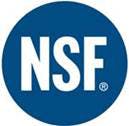First brake manufacturers earn NSF International registration for environmental, friction coefficient compliance
Oct. 30, 2017
2 min read
NSF International, a global public health and safety organization, has registered its first brake friction manufacturers for compliance with both environmental and friction coefficient (brake pad) requirements. Ask Technica Corporation, Danaher Auto Spare Parts Co., Ltd., Tramelco Go+Brakes LLC, Yancheng Fantian Autopart Co.,Ltd. and EMPI Inc., all earned independent third-party registration from NSF International. The registration is recognized by California, Washington and other states, and demonstrates compliance to both safety and environmental requirements.
The environmental compliance registration includes an evaluation of copper levels and other constituents in brake pads according to the SAE J2975 standard Measurement of Copper and Other Elements in Brake Friction Materials. The coefficient of friction (brake pad) registration complies with the Vehicle Equipment Safety Commission (VESC) V-3 Minimum Requirements and Uniform Test Procedures for Motor Vehicle Brake Linings. The SAE J661 brake lining quality test procedure and an independent review are part of the registration process.
“Expansion of NSF International’s brake friction material service provides manufacturers a one-stop source for registration of both edge codes and coefficient of friction and environmental compliance for brake pads, all at the same time,” said Bob Frayer, Global Managing Director, Automotive Certification, NSF International. “NSF International does this to provide manufacturers a competitive edge in the marketplace.”
NSF International registered brake friction materials are marked with an identifying edge code containing a company-assigned ID, formulation identification code, hot and cold friction coefficients (e.g. FF, EF, GH, etc.) and environmental designation. All NSF International registered brake material companies appear in NSF’s online registration listings.
For more information about brake friction materials registration with NSF International, please email [email protected], call +1 (734) 214-6210 or visit nsfautomotive.com.About NSF International: Founded in 1944, NSF International (nsf.org) is an independent global organization that writes standards, and tests and certifies products for the automotive, food, water, health sciences and consumer goods industries to minimize adverse health effects and protect the environment. In addition to providing NSF automotive certification, the company is one of the world’s largest automotive registrars to ISO/TS and IATF 16949 via NSF International Strategic Registrations (NSF-ISR).
About the Author

Motor Age Wire Reports
These are press releases approved by our Motor Age Editors
Sign up for our eNewsletters
Get the latest news and updates
